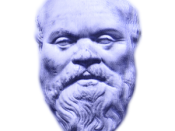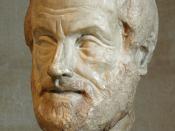Virtue theory is a branch of moral philosophy which lays emphasis on character rather than rules and consequences as the key element of ethical thinking. Virtue theory goes back to the Ancient Greeks who introduced concepts such as arête (excellence or virtue), phronesis (practical or moral wisdom) and eudaimonia (flourishing).
PlatoAccording to Plato, one should try to do the right thing or be good because it is in one's own self-interest. This he said for two reasons.
1.He believed that good people had a much more pleasant time in the afterlife as compared to bad people.
2.He believed that being good is good, i.e. it is intrinsically valuable.
Plato believed that the well-ordered soul is ruled by reason which knows that it is good to be good. In addition, this soul is ruled by spirit. Together, reason and spirit dominate the bodily appetites.
He thought that a well-ordered soul was good for two reasons1.
It would get you whatever you want more effectively than a soul dominated by animal desires.
2.It is harmonious and beautiful and can be called 'right'.
In Plato's view therefore, goodness has both prudential and intrinsic value because it is useful as well as beautiful.
In his Republic, Plato emphasized four virtues which were later called Cardinal Virtues. These are wisdom, courage, temperance and justice. The other virtues are fortitude, generosity, self-respect, good temperance and sincerity.
AristotleAristotle contrasts Plato by rejecting the idea of goodness as proposed by Plato. Instead, he believes that some things are right for members of a certain species. He believes that human beings should be human. This means that because reason separates us from other species, we should be ruled by the rational part of ourselves. In addition, because we are naturally social...


